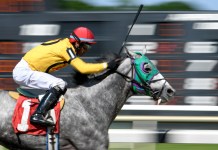Las Vegas
If the Kentucky Derby can be in September, and the Preakness in October and the Belmont Stakes in June, then why can’t Festivus be in August? Four months and two days early, with nods to West-Shapiro Productions and Castle Rock Entertainment, let’s go.
Airing of grievances
I got a lotta problems with you people, specifically the ones who are keeping Nevada horseplayers from betting on the Kentucky Derby.
By all accounts Churchill Downs Inc. and the Nevada Pari-Mutuel Association, the cartel that represents the state’s racebooks, have not spoken to one another in months. And months are how long their impasse has lasted. By this weekend it will be 300 days and 300 nights that have come and gone since hostilities began over what is apparently less money that it would cost to pay one day’s worth of electricity at the state’s racebooks.
“We don’t have an update to report on this issue, unfortunately,” CDI spokeswoman Tonya Abeln said in a text Thursday afternoon. “I’ll be sure to reach out if there are any changes on our end.”
Patty Jones, who has been the executive director of the NPMA for nearly 23 years, could not be reached for comment Thursday. Or ever. VSiN has been trying for nearly 10 months.
As an alternative, Las Vegas bookmakers are preparing to book the Derby on their own. Other than the futures books at Circa Sports and William Hill Nevada, they are expected to be in lockstep with the prices shown on the toteboard at Churchill Downs. They could have pooled their resources to have their own pari-mutuel pool, but one source told VSiN, “It’s too late to do that.”
Instead, there will be hard limits on the payouts at any sportsbook that will try to book the Derby. Or the Oaks. The terms of engagement will vary from casino to casino, and it is entirely possible that a full day’s race card might not be booked. Some smaller racebooks might not take any Derby week action at all.
Because of the liability involved with honoring track odds, do not expect to see superfectas or Pick 5s on the Nevada betting menu. “You could see full track odds paid to the first $200 or the first $500,” one Las Vegas casino insider said. “After that the payout would be capped. I’d hate to predict what those limits might look like.”
In short it is a mess, one that was completely avoidable if either side had been willing to even feign a blink. At last word during the spring CDI wanted 7½ cents of every dollar bet in Nevada on its races – and even more for the Derby. The NPMA wanted to stay at the roughly 6¾ cents that it had been paying before they severed their relationship last Oct. 27.
In the end this is all about chump change. Last year Nevada books generated $6 million in Derby bets. That means of the nearly $251 million all-sources handle, the state accounted for only 2.4 percent of it. Even if Churchill Downs wanted 10 percent of the state’s bets on the Derby, that would be a jump from about $400,000 to $600,000. Take that difference of $200,000 and divide it by the 82 properties that book pari-mutuel racing in Nevada, that breaks down to $2,439 per shop. That would not even pay the power bill at one of them for a full day.
One manager in Nevada said, “I’ve seen these things happen before, and every time they always sign the contract at the end.”
Asked what the odds might be of that signing taking place in time for the Derby, the answer was, “7-5.” When reminded of the small potatoes that have driven the two sides apart, the answer was revised. “Make that 8-5.”
Come to think of it, wasn’t there a stupid pay dispute at a bagel shop on that Festivus episode of “Seinfeld”?
Feats of strength
Until you pin me, Festivus is not over. Nor until Tiz The Law crosses the finish line Sept. 5.
There is strength in the futures numbers for the Belmont and Travers winner. He remains the even-money favorite at Circa to win the Derby, and he is 4-5 at William Hill.
But how to measure these feats of strength – and not just with Tiz The Law. Knowing that 25 of the last 28 Derby winners have had career-best Beyer Speed Figures of at least 95 before those victories, Tiz The Law looks like a behemoth with his 109 from the Travers. That would be the 1¼-mile Travers, wiping out any doubt about whether he can get the distance.
Now look at the other two of the Derby’s big three. Blue Grass and Ellis Park Derby winner Art Collector (6-1 Circa, 9-2 William Hill) had a 103; Santa Anita Derby winner and Shared Belief runner-up Honor A. P. (13-2, 7-1) a 102.
The problem with the 95 Beyer optic is that it was established back in the old days when the Derby was run in May. (“Gee, Pop. What was it like back in 2019?”) Looking at their best figures by what would have been Derby day, Tiz The Law had a 100, Art Collector 87 and Honor A. P. 95.
Right now there are 13 candidates for the Derby that have best Beyers of at least 95. That is not exactly culling the herd. If lifting a 95 was supposed to be a feat of strength in the middle of spring, some added weight is needed late in the summer.
Get the pole
If you find tinsel distracting, how about accurate race times?
Somehow, with microchips in saddle cloths and GPS tracking systems, 21st century technology is not as reliable as some old geezer like me watching a race on TV and timing it with an app. Or a stopwatch. Or a calendar.
In other words, it is far better to watch a horse move past the pole – the half-mile pole, the eighth pole, the quarter pole – and time it the old-fashioned way than it is to trust Trakus and Gmax, the systems that put those hovering chiclets on racetrack video boards and our TV screens.
According to Thoroughbred Daily News, the new Gmax system at Del Mar is so bad that the track’s staff has gone back to hand-timing all the turf races – and has been doing so for most of the current meet.
In use for 14 years Trakus has had its share of critics, too, including management at Del Mar. It found the system unreliable and inaccurate before it switched. But Gmax, the replacement system that was developed in England, has seen its final times revised at several racetracks, according to TDN. The changes have been logged by Equibase, which is a Gmax partner.
Speed-figure patriarch Andy Beyer and his team have abandoned the seemingly inferior new technology in favor of their own recalibrated video reviews.
The good news is that the ill-timed bad timing has not gone unnoticed. The bad news is that the solutions appear to take us back to a time when VCRs and DVDs were state of the art. And when Hollywood Park was still open.
A Festivus miracle
How did you know Maximum Security was here? By the entries for Saturday’s $500,000 Grade 1 Pacific Classic at Del Mar.
Despite winning by just a nose his last time out, Maximum Security (1-1) was still made the morning-line favorite in his second race since he was transferred from indicted trainer Jason Servis to the barn of Bob Baffert.
That last time out was last month’s Shared Belief Stakes in which Midcourt (7-2) was caught and finished second. Higher Power (3-1) was third, making him 0-for-5 since he won last year’s Pacific Classic.
If jockey Abel Cedillo had taken Maximum Security to an early lead rather than having him stalk the pace, he might have avoided last month’s close call. The fact that this race at 1¼ miles is 330 yards longer might also help him.
This is not exactly a get-rich-quick scheme. Unless he shortens to some bridge-jumper price I like Maximum Security on a simple win ticket Saturday.
I will also sprinkle a little something extra to include Miriñaque (10-1), a two-time Group 1 winner in Argentina that is making his U.S. debut for trailblazing trainer María Muñoz. She has already broken a 135-year gender barrier by winning big races in what has been an exclusively male domain in Argentina.
By the way, Miriñaque (pronounced mee-rin-YAH-kay) is Spanish for crinoline (pronounced KRINN-oh-linn). Remember that? It was a stiff material that was used to make hoop skirts. Crinoline comes from the French word crin (pronounced krann), which means horsehair.
What are the odds that a horse would be named for horsehair? It really is a Festivus miracle.
Ron Flatter’s weekly racing column is posted every Friday morning at VSiN.com. You may also hear the Ron Flatter Racing Pod posted Friday mornings at VSiN.com/podcasts. Next month’s Kentucky Derby and this weekend’s Pacific Classic are the focus of the current episode of the RFRP. XBTV analyst Jeff Siegel offers his thoughts about both races. Jockey Flavien Prat talks about defending his 2019 Pacific Classic victory and why he will not be defending his Kentucky Derby win. DraftKings Sportsbook’s Johnny Avello handicaps weekend races at Del Mar and Saratoga. The RFRP is available via Apple, Google, iHeart, Spotify, Stitcher and at VSiN.com/podcasts and is sponsored by 1/ST BET.




